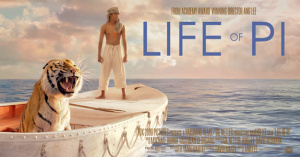Pi’s Path to God
Jesus answered, “I am the way and the truth and the life. No one comes to the Father except through me….” (John 14:6)
If you ask Christians what they are most thankful for out of everything in their lives, you’ll likely find that Christ’s “amazing grace” tops the list. For those willing to accept the offer, Jesus’ sacrificial death paid the way to heaven even though humans do not deserve it and cannot repay it. Salvation by grace is an idea unique to Christianity. In 7 Truths That Changed the World, RTB philosopher/theologian Kenneth Samples writes, “Christianity at its heart is a religion not of self-help but of divine rescue.”

Many people today believe all faiths are valid paths to God, eternal life, etc. Yann Martel’s award-winning bestselling novel, Life of Pi, illustrates this view. Pi is a young Indian man who, in addition to holding his family’s Hindu faith, adopts Islam and Christianity. He views the three religions as different ways to approach God and appreciates aspects of each one.
Though it’s been almost a decade since I read the book, I still remember greatly enjoying the entertaining tale of 17-year-old Pi’s adventures stranded aboard a lifeboat with a Bengal tiger. I was not appreciative of his pluralistic approach to faith.
Religious pluralism ignores reality in its attempt to strip the world’s major faiths of their differences and boil them down to a common denominator. Ken’s book A World of Difference aptly demonstrates the profound differences between various major worldviews. Take, for example, the different “salvation solutions” offered by Pi’s three religions of choice: Hinduism, Islam, and Christianity.
- Hinduism (a form of pantheistic monism): This worldview posits that humans must overcome the illusion (maya) that they are “separate and distinct from God” and reunite with Ultimate Reality. In order to do this, humans need to achieve enlightenment, thus breaking the cycle of reincarnation (due to the Law of Karma). There are no assurances of accomplishing this goal.
- Islam: Muslims “insist that sin is merely the result of willful disobedience” and that people will be judged according to their deeds. Entrance into paradise must be earned, but it is not guaranteed because Allah can determine a person’s eternal destiny “based upon his sovereign or arbitrary will.”
- Christianity: According to the Bible, human beings are separated from God due to our sinful nature. Yet God Himself reached across the divide by becoming a sinless man (Jesus Christ), dying as a sacrifice in humanity’s place, and rising from the dead. Moreover, salvation (eternal life in God’s presence) is assured (Hebrews 10:19–23) for those who willingly accept Christ as Savior and Lord.
It’s helpful to consider other views and how to evaluate them. With a film adaptation of Martel’s book hitting theatres this month (and already touted as a likely contender for Best Picture), it will be interesting to see what kinds of faith-focused discussions this movie inspires. Get prepared with these resources from RTB:
- The Kenneth Samples Bestsellers Pack: includes Without a Doubt, A World of Difference, and 7 Truths That Change the World
- Blog (Take Two): “Putting Beliefs to the Test: 9 Ways to Know if Your Worldview Is Reliable”; “What’s It to You?”; “A Real Good Thing”; “Filing for Spiritual Chapter 11 Protection”
— Maureen
If you’d like a free copy of RTB’s 2013 wall calendar, leave a comment below letting us know what you’re grateful for this year and we’ll pick a few of our favorites. You can also receive this calendar in appreciation for your gift to RTB in any amount. Click on the Donations page for details.
Looking forward to reading what you’re thankful for!





